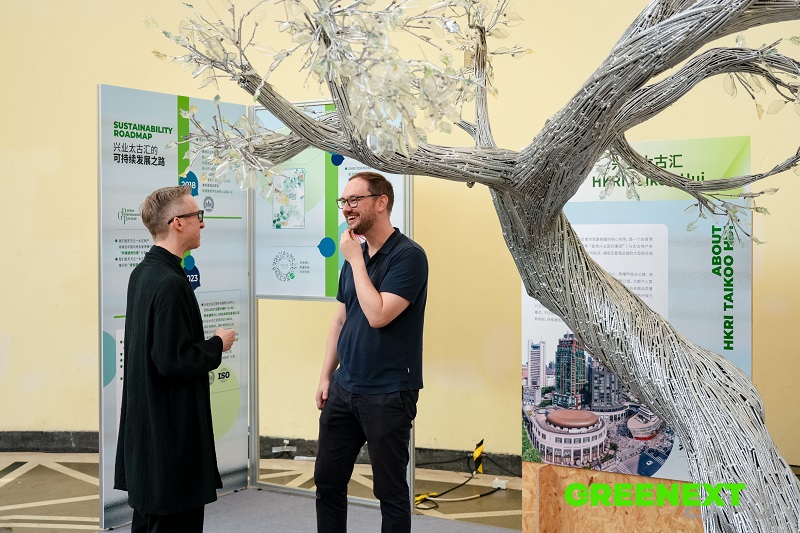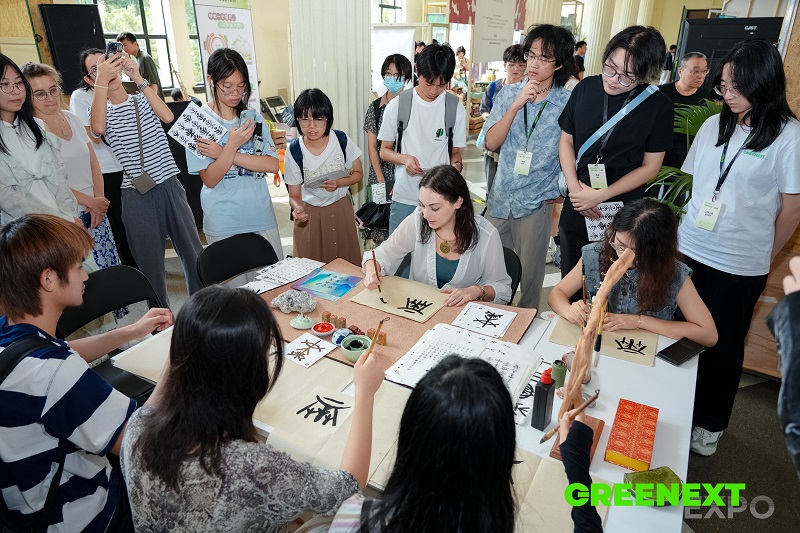FW
Jonathan Anderson, Creative Director, Dior launched his new women’s ready-to-wear collection at the Paris Fashion Week. Having joined the LVMH-owned label in March and showed his menswear collection in June, Anderson is part of a new guard aiming to reinvigorate the luxury industry amidst a prolonged slowdown.
Anderson showcased the iconic Bar Jacket. Famous for its cinched waist, Anderson’s version was loosened, featuring added volume at the back and paired with a pleated mini skirt that also dramatically jutted out.
This look established the foundation for ‘a bold new chapter’ at Dior, according to Simon Longland, Director – Buying, Harrods. He described the collection as one built on contrasts: ‘couture against everyday ease, femininity with androgyny, covered versus sheer.’
Held in the Tuileries Gardens, the show opened with a fast-paced, black-and-white film styled like a horror movie, flashing images from the label’s history. Models then took to the runway, showcasing a range of looks including mini skirts with long wool capes, suit jackets with high collars, dresses with open backs, lightweight knit ensembles and jeans styled either slim or with an ample, barrel-legged silhouette.
The impressive guest list included K-pop sensations Jimin and Jisoo, alongside actors Jennifer Lawrence, Johnny Depp, Jenna Ortega, and Mickey Madison. The audience responded with a standing ovation as Anderson quickly took his bow following the finale.
At the 74th Annual General Body Meeting of the Mumbai unit of the Textile Association (India) [TAI], Rajiv Ranjan was unanimously reelected as the President for the 2025-26 to 2028-29 term. RR Patil was also elected as the new Vice President.
A highly regarded senior professional and strategic business leader with over 40 years of extensive, cross-functional experience in the Indian textile industry, Ranjan has been responsible for managing the Profit & Loss (P & L) for major businesses and demonstrating competence in leadership roles such as Executive Director & CEO, Hindoostan Mills (Thackersey Group), Mumbai and President-Textiles, Mafatlal Industries, Mumbai.
"In these roles, he successfully spearheaded leadership, business, and people transformation. He has a proven track record of setting up Greenfield projects and turning around operations to scale them into sustainable and profitable ventures.
Besides, the TAI Mumbai Unit also appointed the following individuals to other leadership positions. C Bose was appointed as the President Emeritus while VC Gupte was elected as the Chairman. GS Nagirer and VA Bhajekar were elected as Vice-Chairmen. Haresh B Parekh was elected as the Hon Secretary while Navin P Agrawal and Rajendra Ranadive were both named as Joint Honorary Secretaries. Prof KD Gawant was named as the Honoray Treasurer.
"
The three-day, third edition of the Ecosystex conference highlighted a sharp paradox in the continent’s sustainability efforts: a wealth of cutting-edge research is running into a rapidly shrinking industrial base.
Co-organized by the Textile ETP and RISE Research Institutes of Sweden, the Ecosystex conference attracted 160 participants from over 20 countries. The event showcased a promising pipeline of EU-funded projects with an investment nearing €400 million, focusing on innovations like complex textile recycling and pilot materials such as hemp and lignin.
Despite the enthusiasm for scientific progress, a major concern surfaced: Is Europe genuinely on track to industrialize this research, or are these efforts ‘just building castles in the air?’
A subsequent visit to the innovation hub at Science Park Borås underscored the core challenge. While the knowledge base is strong, the industrial landscape presents formidable obstacles. Weak end markets, particularly in fashion and automotive, are forcing companies to cut costs, scale back innovation, or shut down entirely. This creates a critical disconnect: the factories closing in 2025 will not exist to implement new technologies when long-awaited regulations like the Ecodesign for Sustainable Products Regulation (ESPR) and Extended Producer Responsibility (EPR) finally take effect.
The ‘promised land’ of smart regulation remains a waiting game. Although the separate collection of post-consumer textile waste is increasing, viable recycling use cases are lagging. Meanwhile, the rapid growth of ultra-fast fashion continues unchecked, seemingly oblivious to the EU's ambitions to curb its environmental impact.
This situation poses a serious problem for the next generation of talent. Bright, young researchers are being trained in sustainable textile practices but may struggle to find industrial pathways to apply their skills within Europe.
The question now shifts to policy. The industry is anxiously waiting to see if the anticipated EU Clean Industrial Deal or the upcoming Circular Economy Act will provide the necessary support and incentives to ensure Europe becomes a leader, not just a spectator, in the circular textile future. While hope remains for the research, a deep anxiety about Europe's industrial capacity to bring it to life persists.
The European Union has published a revised Waste Framework Directive, kicking off a new era for sustainable textiles. The directive sets a firm timeline for Member States to implement Extended Producer Responsibility (EPR), a policy that requires businesses to take financial and operational responsibility for their products at the end of their life.
The new rules create a 20-month deadline for EU Member States to transpose EPR into their national laws. This means each country must establish a clear framework for how apparel and textile companies will finance and manage the collection and treatment of garments once they're no longer usable. Following this, Producer Responsibility Organizations (PROs) must be fully operational within 30 months. These organizations, funded by producers, will be key to managing the collective obligations under the EPR, including setting up collection systems, ensuring materials are recycled properly, and reporting compliance to authorities.
The European Apparel and Textile Confederation (EURATEX) has welcomed the directive but stressed the urgent need for a unified approach across the EU. The organization has long advocated for a single market for secondary raw materials and the harmonization of EPR schemes to prevent a fragmented, "patchwork" of national regulations. According to EURATEX, a harmonized framework is crucial for supporting competitiveness and innovation within Europe's textile industry.
EURATEX has outlined its key priorities to ensure the directive’s successful implementation, which include ensuring strong market surveillance and coherence with other related legislation, such as the Circular Economy Action Plan (CEA) and Ecodesign for Sustainable Products Regulation (ESPR).
Looking ahead, EURATEX is set to discuss these developments further with its members at the upcoming Textile PRO Forum plenary meeting in November, reinforcing its commitment to a fair, effective, and harmonized framework that benefits both the environment and the European textile sector.
Kohl's is growing its exclusive brands portfolio by launching the FLX apparel range for kids. This activewear and athleisure collection for children and pre-teens combines comfort, function, and style at a great value.
Offering versatility and performance, the new collection features a modern palette of elevated neutrals, wearable everyday silhouettes, and must-have styles like joggers, zip-ups, hoodies, and performance tees that are built for movement and designed to last.
Fit-tested with real movement and self-expression in mind, the new kids' collection balances a modern aesthetic with the functional details today's families expect. With prices ranging from $14.99 up to $50, and sizes running from boys' 8-20 and girls' 7-16, the assortment is designed to keep pace with growth spurts, style shifts, and parents’ budgets.
Nick Jones, Chief Merchandising Officer, Kohl, says, the collection underscores the brand’s continued work to elevate proprietary brands that deliver trusted quality, relevant style, and incredible value for Kohl’s customers."
The FLX apparel for kids serves as a natural transition between children’s styles and adult shapes, offering older kids an opportunity to express their evolving personal style through wearable, playful designs focused on comfort, movement, and fun.
Emmy Jean Woodhall, Creative Design Director, Kohl’s, avers, the brand is ware of how style evolves rapidly, especially for kids entering their tween years. This age group is forming identity and gravitating toward looks that feel more grown-up, but is still playful. The FLX apparel collection for kids reflects this shift with adjusting silhouettes, proportions, and colorways.
The apparel pieces in this collection are made from soft, breathable materials, a focus on fit, and an age-appropriate aesthetic that meets the needs of both parents and kids. With new styles set to be introduced each season, the collection will continue to evolve, giving parents more options as their kids grow and their needs change.
The launch of the new kids' collection marks the next chapter for FLX, a customer-loved brand that debuted in 2021 and has become a standout in Kohl’s proprietary brand offerings. By expanding FLX, Kohl's is reaching more customers and reinforcing its commitment to style, comfort, and value for every generation. This addition to Kohl’s broader brand portfolio - which includes an assortment of exclusive private labels and trusted national names - helps the retailer deliver a well-rounded, accessible selection that meets the evolving needs of today’s families.

In a world where apparel has long been both an economic indicator and a cultural barometer, the September 2025 Wazir Advisors Global Apparel Trade & Retail Update Report paints a picture of uneven momentum across markets. While consumer demand in some economies shows encouraging resilience, supply-side headwinds continue to weigh on major exporters, underscoring the complexities of the post-pandemic global trade environment.
Imports, Europe and the UK lead the upswing
July 2025 saw diverging paths in apparel imports across major buyer nations.
• European Union (EU): At $9.6 billion, EU imports rose 19 per cent YoY, making the bloc the standout growth engine for global apparel demand. The rebound reflects a combination of sustained consumer spending, fashion retail promotions, and pent-up demand in key EU economies like Germany, France, and Spain.
• United Kingdom (UK): Recording an even sharper rise, UK imports grew 24 per cent YoY, reaching $2.1 billion, highlighting the strength of its fast-fashion and mid-market segments.
• United States (US): In contrast, the US, the world’s single-largest apparel importer reported a 3 per cent YoY decline in imports, down to $7.7 billion. This drop showcases cautious retailer stocking amid inventory corrections and mixed consumer sentiment.
• Japan: Imports rose 5 per cent YoY, touching $2 billion, driven by a gradual recovery in department store sales and steady demand in premium casualwear.
Together, these numbers underline a shifting center of gravity, European markets are driving near-term global apparel import growth, while the US, despite its size, is displaying more cautious trade behavior.
Export, Asian giants under pressure
On the supply side, exporters are facing a more challenging environment.
• China: Still the dominant supplier, China’s apparel exports in August 2025 fell 11 per cent YoY to $13.6 billion. Rising labor costs, slowing Western demand, and increasing scrutiny on supply chain sustainability have weighed on performance.
• Bangladesh: Once a reliable growth story, Bangladesh reported exports of $3.1 billion, down 6 per cent YoY. Order slowdowns from US and EU buyers, combined with energy and wage inflation, are affecting competitiveness.
• India: India’s apparel exports slipped 8 per cent YoY to $1.2 billion, as the sector grapples with a weak global demand cycle and domestic raw material price volatility.
• Vietnam: Breaking the trend, Vietnam posted 3 per cent YoY growth, reaching $3.9 billion. Its strong trade agreements and positioning in synthetic apparel categories are providing a relative edge.
The diverse stats highlights a broader shift, buyers are increasingly diversifying sourcing away from China and Bangladesh, with Vietnam emerging as a resilient alternative, while India continues to face structural competitiveness issues.
Retail Outlook: Consumption gains but e-commerce stalls
At the consumer end, retail activity offers a more optimistic counterpoint to the export slowdown. US: Apparel sales in August 2025 grew 5 per cent YoY, showing steady resilience despite economic uncertainties. Home furnishings, however, fell 4 per cent YoY, signaling a possible spending rotation toward clothing and personal style categories.
Interestingly, e-commerce sales of clothing and accessories declined 3 per cent YoY in Q2 2025, suggesting online channels may be maturing, with physical retail regaining traction.
India: The domestic story was more buoyant, with apparel retail sales in July 2025 up 9 per cent YoY. Driven by festive season pre-sales, rising middle-class consumption, and expanding organized retail formats, India continues to remain a bright spot in global apparel consumption trends.
Economic signals Underlying these retail dynamics are nuanced macroeconomic signals, particularly in the US. The Consumer Confidence Index (CCI) edged up to 97.4 in August 2025, from 97.2 in July, indicating cautious optimism among households. The labor market, however, showed cracks, only 22,000 jobs were added in August, and the unemployment rate ticked up to 4.3 per cent from 4.2 per cent. For apparel retailers, this mixed picture means balancing optimism in spending with caution around inventory buildup.
A fragmented global apparel map
The Wazir Advisors September 2025 update suggests that the global apparel industry is no longer moving in lockstep. Europe and India are powering consumption, while US and Japanese buyers remain selective.
Export leaders like China, Bangladesh, and India are losing momentum, while Vietnam quietly gains share.
In retail, apparel demand is stable to positive, but channel dynamics are shifting brick-and-mortar resilience against slowing online sales is reshaping strategies. And global trade flows are increasingly shaped by macroeconomic uncertainty, inflationary pressures, and shifting consumer priorities.
Thus as fashion cycles compress and supply chains diversify, the apparel trade is entering an era of regional fragmentation and selective growth. For global brands, retailers, and sourcing hubs, agility not scale may define competitiveness in the coming quarters.
The GREENEXT Expo 2025, held over two days on September 26-27, 2025 at the Shanghai Exhibition Center, not merely as a showcase, but as a crucial nexus for turning green ideals into profitable, scalable business models. Attracting 5,022 attendees and featuring solutions from over 120 enterprises, the event championed a model defined by Sustainability Innovation × Cross-Sector Collaboration × Business.
From 'Why' to 'How': A call for tangible solutions

The Expo's central message—that sustainability has moved past debate into execution—was articulated by Dr. Hong Zheng, Founder of GREENEXT, in her rousing keynote, “Sustainability is a journey carried by tangible solutions—from product design to business models, from technological innovation to cultural expression, transforming green ideals into perceptible, tangible, and communicable practices,” Dr. Zheng stated.
The focus was sharp: transitioning the discussion from a philosophical "why" to a practical "how." The event targeted four critical commercial scenarios essential for driving China's green economy forward: Urban Regeneration, Global Expansion (building trust in cross-border supply chains), Technological Innovation (unleashing youth creativity), and embedding Public Good for enduring business competitiveness. “Our shared mission is to ensure businesses thrive sustainably while fostering an enduringly prosperous planet", emphasied Dr. Hong Zheng.
The Six Zones: Where fashion meets regenerative farms
The exhibition floor mapped out the full spectrum of the sustainable value chain across six dedicated thematic zones, offering more than 200 case studies.
● The Fashion Forward zone directly confronted the textile industry's high-impact footprint, showcasing everything from green raw materials to smart manufacturing. Leading brands like adidas and the Ellassay Group presented innovative pathways toward circular fashion.
● Living Earth connected consumers directly to nature, spotlighting regenerative agriculture and responsible sourcing. Exhibitors like The Macallan detailed transparent supply chains—from “field to bottle”—rediscovering the value of green raw materials in daily life.
● The Green for Next zone focused on corporate transformation, with giants such as HKRI Taikoo Hui and Tencent CarbonXmade showcasing solutions for carbon auditing, green investment, and building resilient circular systems.
Global dialogue and the new aesthetic of luxury
The conference track was a cornerstone of the Expo, featuring 183 global experts across 77 events, including a series of high-level panel discussions.
The dialogue extended beyond traditional environmental topics to redefine commercial value. Ruifang Ding of HKRI Taikoo Hui captured this new paradigm perfectly, introducing the concept of "The Third Aesthetic of Commercial Spaces: Making Sustainability the New Luxury," offering fresh perspectives for the green transformation of commercial real estate. Meanwhile, the presence of consuls from Nordic nations like Finland, Norway, Belgium, and Denmark underscored the Expo's commitment to Global Collaboration in solving complex supply chain and regulatory challenges.
Initiatives for Tomorrow: Youth, funds, and philanthropy
GREENEXT 2025 cemented its commitment to a sustainable future with several significant launches and awards.
At the Innovation Hub, the official release of the Youth Action Guide for Sustainable Development aimed to mobilize the next generation of innovators. Further underlining the blend of commerce and altruism, the Shanghai Population Welfare Foundation Sustainable Development Fund was jointly announced, promoting the integration of philanthropy and corporate sustainability. The event also celebrated industry leaders at the Global Sustainable Fashion Consumption Industry Pioneer Awards Ceremony.
The human element was profoundly felt at the opening, featuring a heartfelt drum performance by the Love.Disabilities.Love charity initiative and a circular fashion charity dance led by Ambassador Flora Zeta Cheong-Leen, powerfully showcasing social value.
The Sustainable Journey: Public engagement goes interactive
Beyond the halls of commerce and conference, the Expo captivated the public with its specially curated "Sustainable Journey." This immersive route combined art and technology, encouraging visitors to participate in hands-on activities to earn "sustainable rewards."
Highlights included the Climate Fresk workshop, adidas’ Clothes Recycling Green Initiative, and the engaging Plateau × Ocean × City Recycled Plastic Workshop, which transformed complex issues into accessible, hands-on experiences.
GREENEXT Expo 2025 successfully transitioned the dialogue from aspiration to activation, confirming its status as a vital platform for sustainable development in China. Preparations are already underway for the 2026 event, promising to deepen the commitment to co-creating a greener tomorrow.
The Indian Government has extended the Remission of Duties and Taxes on Exported Products (RoDTEP) Scheme for an additional six months, ensuring its continuation until March 31, 2026. This decision by the Directorate General of Foreign Trade (DGFT) comes at a critical time, as Indian exporters face significant headwinds, including 50 per cent reciprocal tariffs imposed by the United States. The extension is intended to provide crucial support and policy certainty to the export sector.
Refunding various central and state duties, taxes, and levies that are not reimbursed under other mechanisms, the RoDTEP scheme will continue to apply its existing rates to all eligible export items. The scheme is compliant with World Trade Organization (WTO) provisions and covers a vast range of products, including over 8,555 items like yarn, sarees, and lungis from the textile industry.
The DGFT's notification confirms, the scheme will remain in force for exports made by Domestic Tariff Area (DTA) units, Advance Authorisation (AA) holders, Special Economic Zone (SEZ) units, and Export Oriented Units (EOUs). However, the operation of the scheme will be managed within the approved budgetary framework of the Foreign Trade Policy (FTP) 2023 to ensure that total remissions during the financial year remain within the allocated limits.
The global sportswear market is forecasted to reach a value of $837 billion by 2035, growing at a 7.6 per cent CAGR from 2024, according to Stratilligence Growth Consultant.
This significant market growth is being primarily fueled by rising global health consciousness and increased participation in fitness activities. Several major trends are driving this trajectory, including the dominance of athleisure, as sports-inspired clothing for casual and performance use continues to widen the customer base beyond athletes. The influence of e-commerce is also key, with brands leveraging online sales, influencer marketing, and personalized advertising to reach consumers globally, making online purchases increasingly popular.
Furthermore, a strong focus on sustainability is shaping product offerings; major brands are responding to consumer demand for ethically made clothing by using recycled materials and low-impact manufacturing, exemplified by Puma's goal of making nine out of ten products from certified materials and India's Rudra Ecovation's zero-waste initiative. Finally, continuous technological fabric innovation, such as moisture-wicking and anti-odor materials, ensures the market remains highly dynamic and competitive.
The Stratilligence report provide a detailed competitive analysis of major players, including Nike, Adidas, Puma, Lululemon, and Under Armour, and breaks down segments by Product (Footwear, Apparel) and Distribution Channel (Online, Offline).
Regionally, the market is characterized by distinct trends: Europe maintains a crucial role with a strong emphasis on sustainability and eco-friendly practices in countries like the UK and Germany. The Asia-Pacific (APAC) region is expected to see rapid growth, driven by urbanization, rising disposable incomes, and large populations in countries like China and India. Meanwhile, the North American market is sustained by its strong culture of athletic participation and health and wellness, ensuring steady demand for high-performance sportswear.
Venture-backed retail innovation company IEM has partnered with a leading real estate investment trust, Simon to launch a groundbreaking experiential retail platform. Built specifically to help high-growth, digitally native brands scale into brick-and-mortar locations, the new model offers a quick, flexible, and efficient path into physical retail.
At the core of the platform are premium, 10x15-foot branded ‘micro spaces.’ These experiential environments are strategically positioned in the highest-traffic common areas of premier shopping destinations. They function as dynamic brand showcases, giving shoppers the essential opportunity to touch, feel, and engage with physical products before purchasing.
Crucially, these micro spaces are designed to act as retail incubators. By offering short-term leases and subsidized rents, IEM allows brands to test market demand, minimize financial risk, and gain maximum visibility without committing to the complexities and costs of traditional long-term retail leases.
IEM backs this physical presence with a modular, turnkey service model. Brands can choose the exact level of support they need from an a-la-carte menu, including design and production, staffing, day-to-day operations, and performance reporting. This flexible approach drastically reduces a brand’s upfront investment while enabling rapid market entry and measurable results.
The platform is already demonstrating strong momentum. IEM has partnered with six emerging brands across categories like performance footwear, modern eyewear, and formalwear. Three of these - OOFOS, Generation Tux, and Caddis Eyewear - have already successfully launched experiential retail environments. Three additional brands are slated to open in high-performing centers later this year and into early 2026.
IEM is built to provide turnkey, data-driven activations tailored for the evolving retail landscape, empowering online brands to launch physical locations with speed, impact, and confidence.

















